From the architect:
Our mission was to reinstate the old home’s glory through highlighting its simplistic characteristics and its overall form. We stripped it right back to a neutral state. The height of the rear addition had the potential to dwarf the original heritage home, so, sympathetically, we mimicked the roof angle, but didn’t hide it.
Nothing about the addition is ‘trying to hide’ anything. The old building transitions smoothly to the new, visually and emotionally, both internally and externally – the old floorboards transition to a new polished concrete slab, the old weatherboards transition to a perforated brick wall (outlining the central Zen garden) and then again to a solid brick wall. The addition, which can be enjoyed from the rear lanes and from within the property, stands proud, like the existing Edwardian; it stands high and strong without any exaggeration or excess. It is brutal, minimal and statuesque: a monolith.
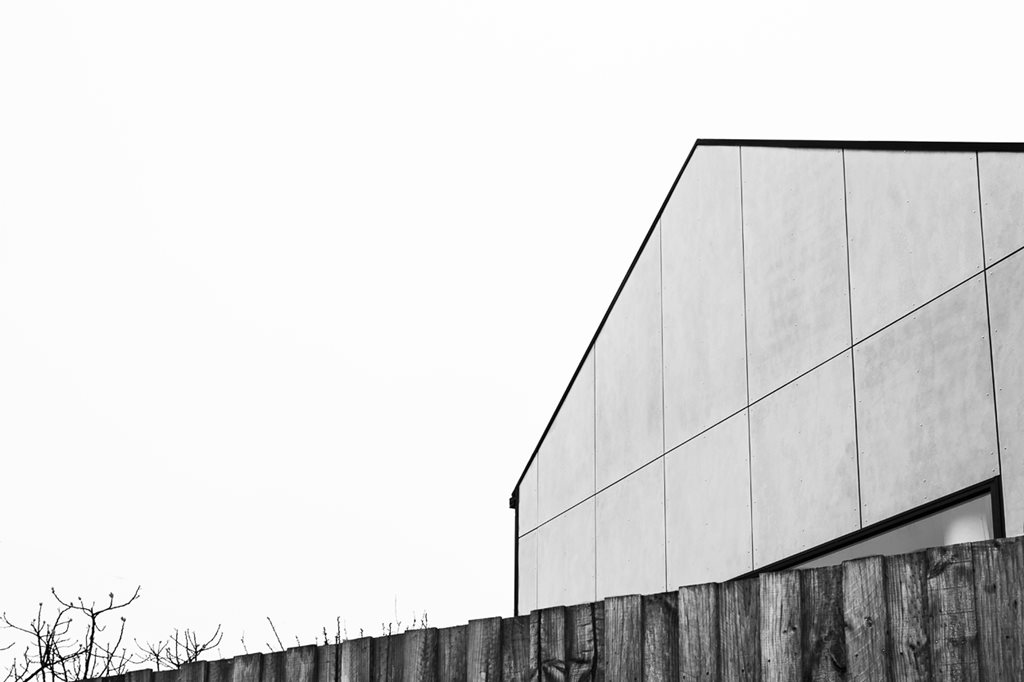
Our client hired us knowing the value an architect can add to the quality of their space. Bianca pushed us really hard to getting an exceptional work of architecture and not something easy [that] they could ‘pull off’ as owner builders. This licensed us to explore some challenging design ideas that were pushed around in council for a while and [were] quite challenging structurally.
The result is outstanding. It’s a humble house, with a simple and modest extension that meets the highest standards; everything is considered. [There are] a variety of different spaces to enjoy and storage for everything. No one would guess there were two toddlers living in the space.
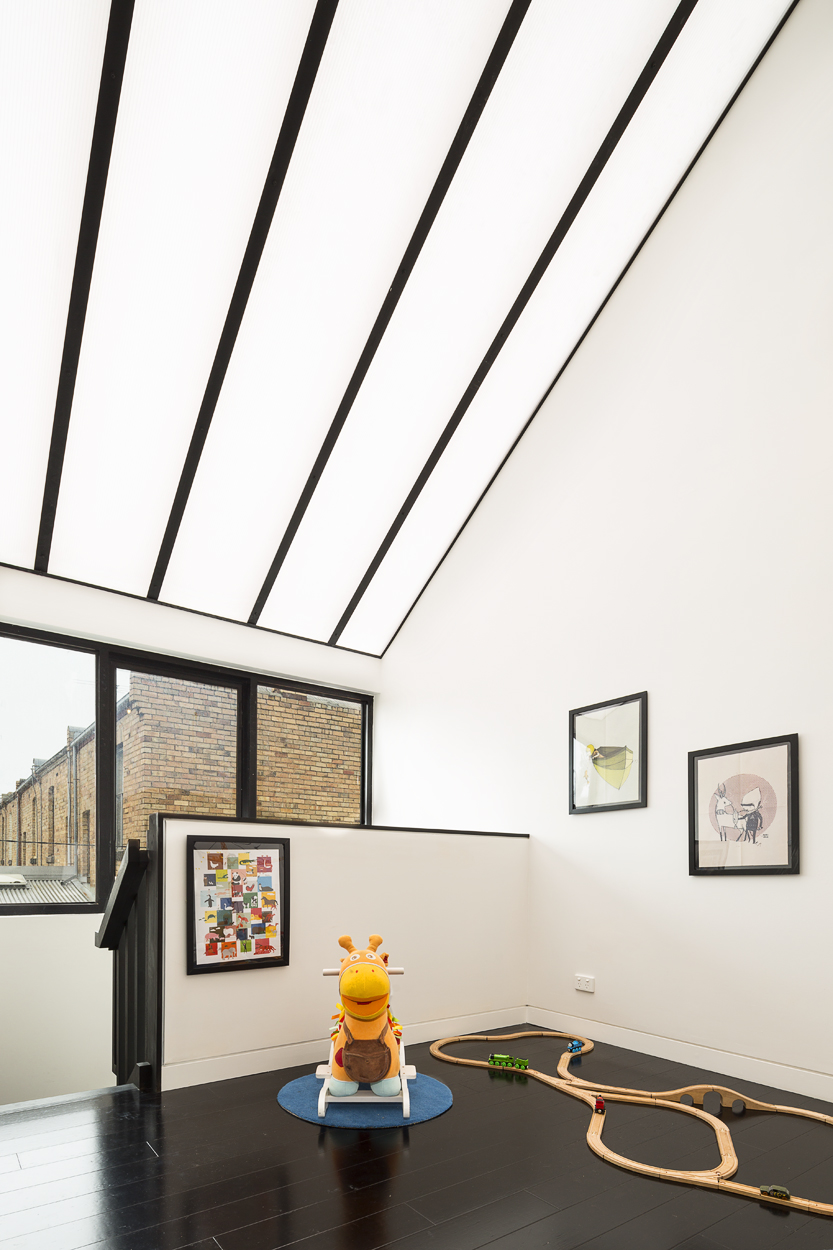
The front half is a fully refurbished double-fronted weatherboard Edwardian with a calm grey palette that celebrates the old. The new mimics the striking form of the Edwardian, while employing the use of modern materials built to last. The design intent is to make the space feel endless and not confined; to be able to see right through the house, regardless of where you are. The new open-plan living and dining areas boast ample space for entertaining by eliminating the island bench. The client wanted to pack away the amenities behind a wall – so we gave her exactly that.
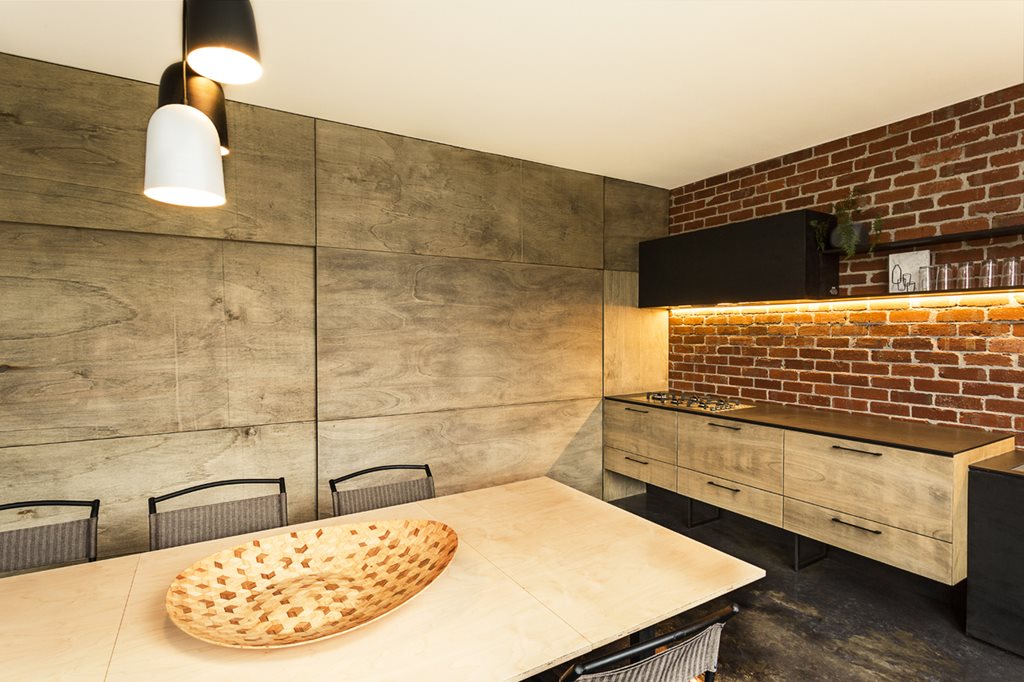
Upstairs, we managed to avoid frosted windows by dropping fixed windows to the floor (more interactive for the children), while having the openable windows above 1.7 metres. The raked cathedral ceilings make the space feel larger than it is in the playroom [and] study area.
The site is less than 300 square metres, making it difficult to design a functional three-bedroom family home with enough subsidiary space for each family member that meets today’s market expectations. So we decided to forget about market expectations and make a truly beautiful space that did all of those things simply and perfectly and suited for a family.
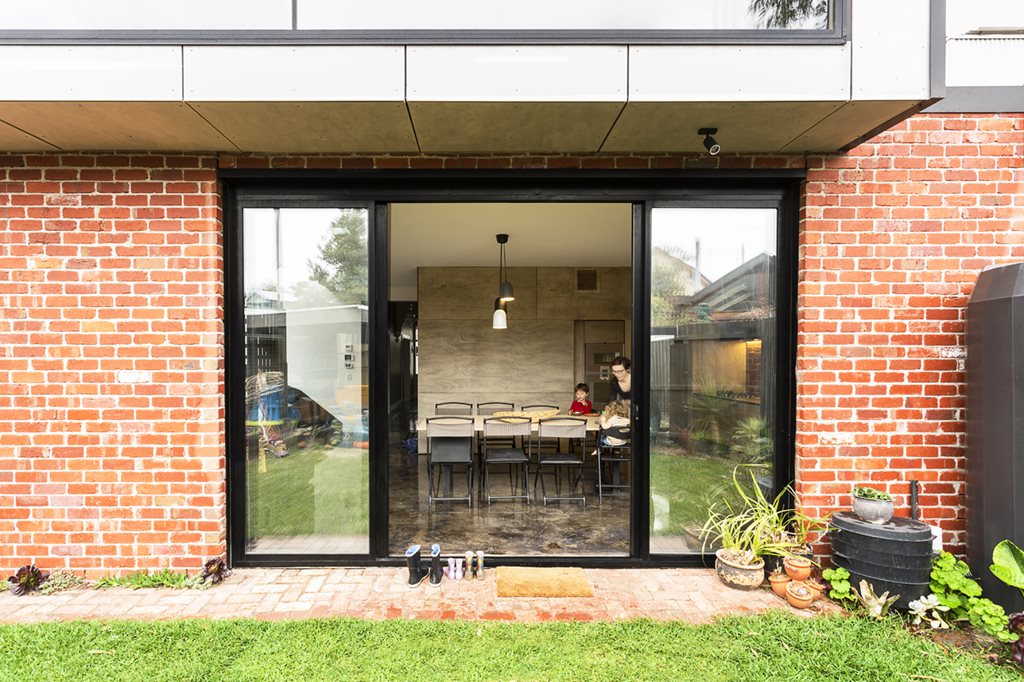
The result is a space that feels like it’s floating. Externally, the façade dons only a slim-line window [that ribbons] the bottom, leaving a brilliantly blank monolithic wall looming over the backyard.
Could you highlight anything unusual or interesting about the construction of the project, including materials and techniques?
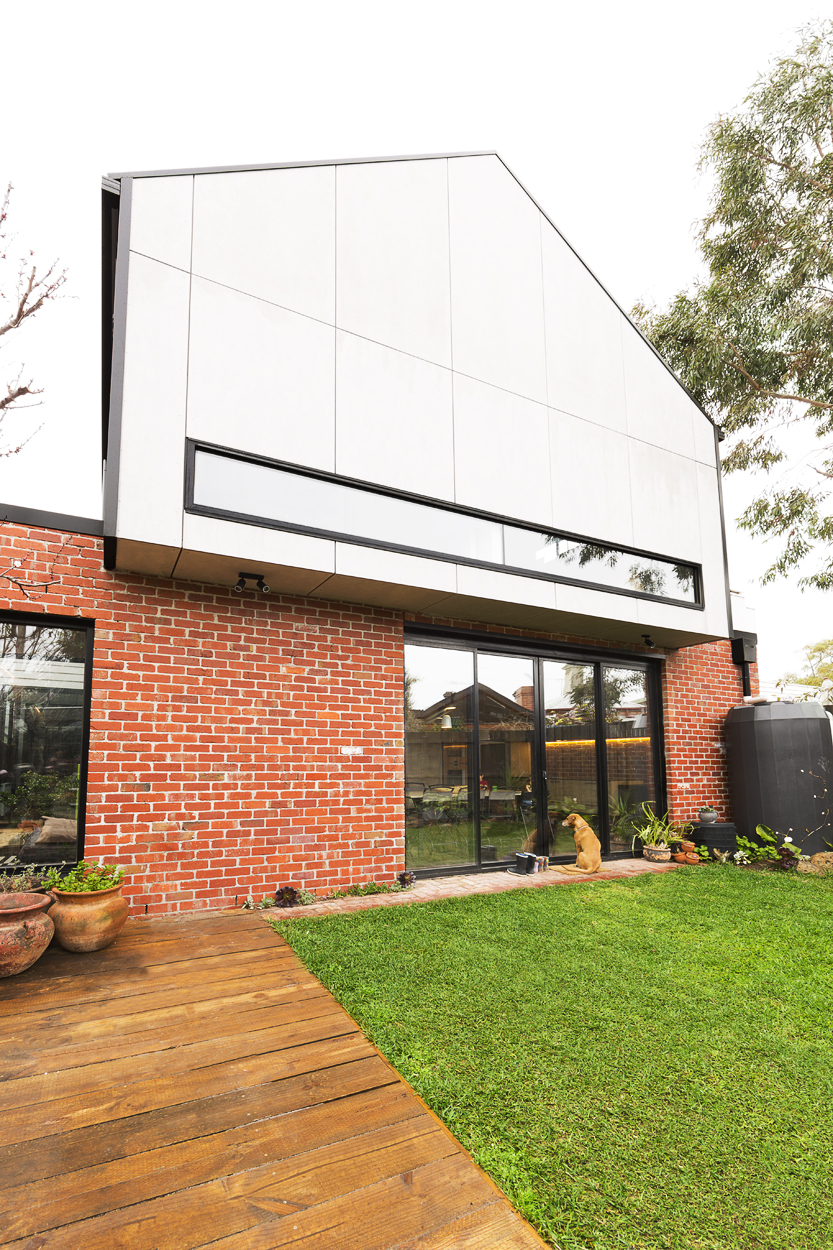
The concrete slab was poured with intent to polish. Over a rainy weekend, some builders left nails on the floor and by the time it was removed, they had left stains on the slab. So to disguise the stain, the finished product has an acid stain, then a charcoal wash finished with an epoxy.
What was (or is) unique or interesting about the site of the project?
The site is only 285 square metres. While it is possible to design a two-storey, three-bedroom house within that site, the client brief was to allow for sufficient living zones to functionally service a family. That was a challenge because we didn't have much of a yard already, and one of the original bedrooms was being consumed by an ensuite / powder room. We had to get creative about how the place felt. Instead of pushing the walls out to the boundaries, our mission was to get as much light onto the property as possible.
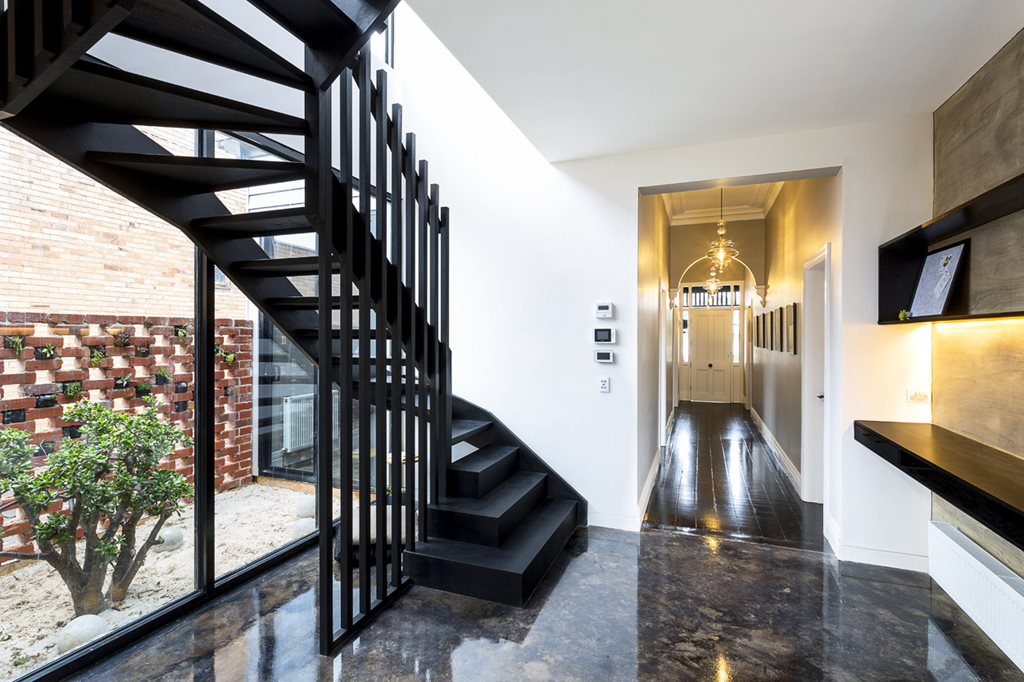
What are the elements of the project [that contribute] towards sustainability (in all its forms)?
We aimed to create a house that would be easy to heat and cool while providing plenty of natural light and a healthy environment for a family. Here are elements that were considered when designing Monolith house as an easily maintained home:
- First-floor extension overhangs the ground-floor sliding doors creating an eave that limits summer heat gain and allows for low winter sun heat gain
- Concrete flooring on the ground-floor extension acts as a thermal mass, absorbing solar heat in winter and radiating into the space after sundown; staying cool in summer to help maintain a low indoor temperature
- Operable windows on both sides of the house facilitate cross-flow ventilation (east/west axis from pantry to internal courtyard, north/south from backyard to front rooms and door)
- Main windows in the living area face north and courtyard is orientated to maximise northern exposure
- Eastern internal courtyard brings ventilation and natural light into multiple spaces (print room, living room, GF hall area, stairwell and playroom area upstairs)
- Low windows in north-facing wall in upstairs bedrooms minimise heat gain
- Walls insulation is 3.5 Earthwool
- All new windows are double glazed, majority of which are Low-E
- Recycled double-brick wall on both boundaries of the ground-floor extension reduce thermal mass transmission via air cavity
- 2000L Rain water tank of collecting roof water used to water the garden
- Hydronic heating throughout the house
- Water-efficient water fixtures
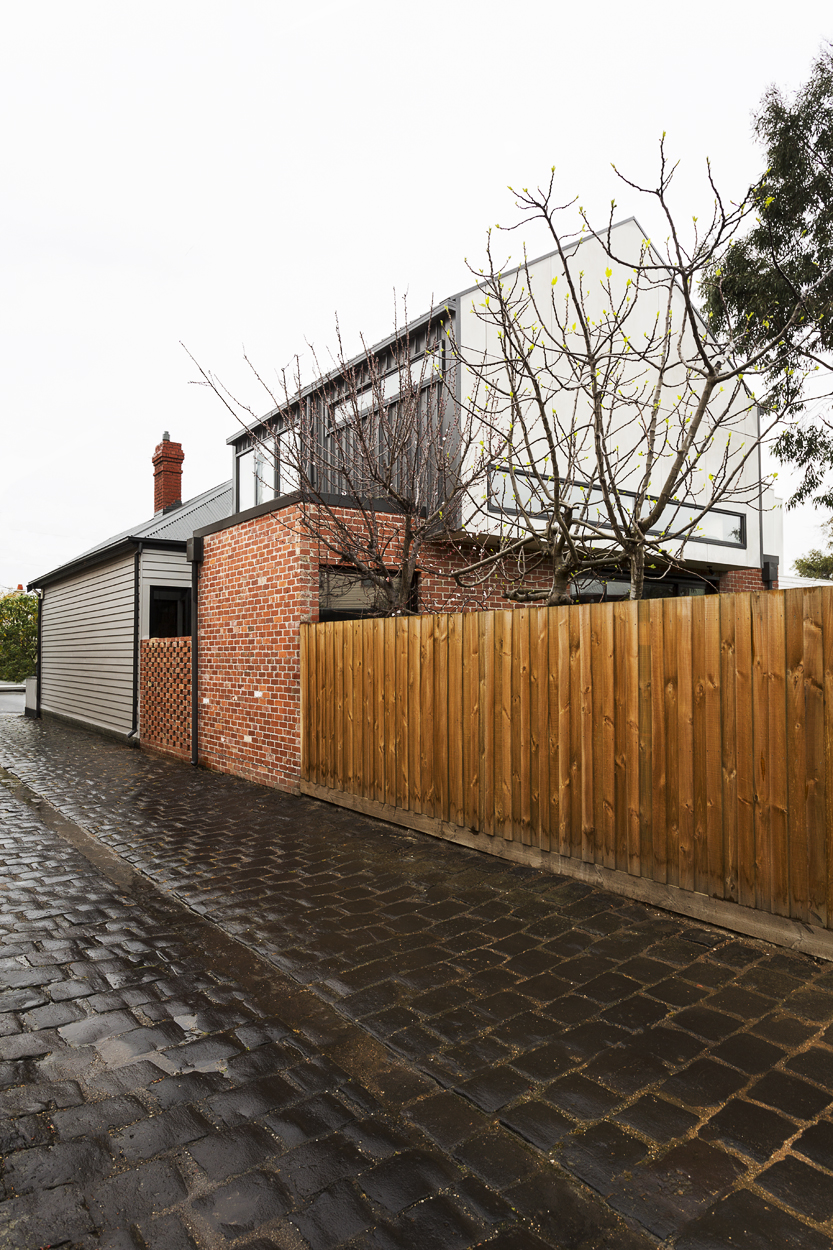
What are the key products used?
- Danpalon roofing used in the gable above the stair well to really flood the southern aspect of the house
- The monolithic façade was achieved using Cemintel Barestone
- The kitchen comes with the best appliances available on the market:
- Gaggenau ovens (pyrolytic, steamer, warming drawer)
- Barazza Gas hob
- Schweigen Rangehood
- Amando Vacarrio Tink B kitchen tap from Abey
- Miele Dishwasher
- Switch plates throughout are Saturn by Clipsal
- The kitchen cupboards are finished in a European poplar ply stained with Cabot's Indian Tea

